- Overview
- What is FMCS?
- Basic Requirements
- Certification Process
- Documents Required
- Certification Fees
- Nomination of AIR
- Product List
- Benefits of BIS Certificate
- Frequently Asked Questions (FAQ)
Overview
Foreign manufacturers looking to sell their products in the Indian market must obtain the ISI Mark Certification from the Bureau of Indian Standards (BIS) under the Foreign Manufacturers Certification Scheme (FMCS). This certification ensures that imported products comply with the relevant Indian Standards (IS codes) for safety, quality, and performance.
The ISI mark is mandatory for various product categories including electrical appliances, industrial items, construction materials, and more. Without BIS certification, these products cannot be legally imported, marketed, or sold in India.
The certification process for foreign manufacturers is governed directly by BIS and includes application submission, factory audit by BIS officials, product testing at BIS-approved labs in India, and ongoing compliance monitoring. Although the process is more stringent for foreign entities, it is essential for ensuring market access and regulatory approval in India.
At SS Global Services, we simplify the BIS ISI certification process for foreign manufacturers. From product testing and documentation to factory audits, license approvals, and appointing an Authorized Indian Representative (AIR), we ensure full compliance with Indian regulations. With our end-to-end support, global brands can achieve BIS FMCS certification smoothly and enter the Indian market with confidence.
Get Service NowWhat is FMCS?
FMCS (Foreign Manufacturers Certification Scheme) is a compliance program introduced by the Bureau of Indian Standards (BIS) to regulate the quality and safety of products manufactured outside India but sold in the Indian market. Under this scheme, foreign manufacturers of notified products are required to obtain the ISI Mark Certification before exporting their goods to India.
The scheme was established under the BIS Act, 2016 and the Conformity Assessment Regulations, 2018, with the aim of ensuring that imported products meet the same Indian Standards (IS) as those applied to domestic manufacturers. This safeguards Indian consumers from substandard imports and maintains fair competition in the market.
FMCS covers a wide range of product categories, including electronics, household appliances, cement, steel products, automotive components, and industrial machinery. To obtain certification, foreign manufacturers must appoint an Authorized Indian Representative (AIR), submit their products for testing in BIS-recognized laboratories, and undergo factory audits conducted by BIS officials.
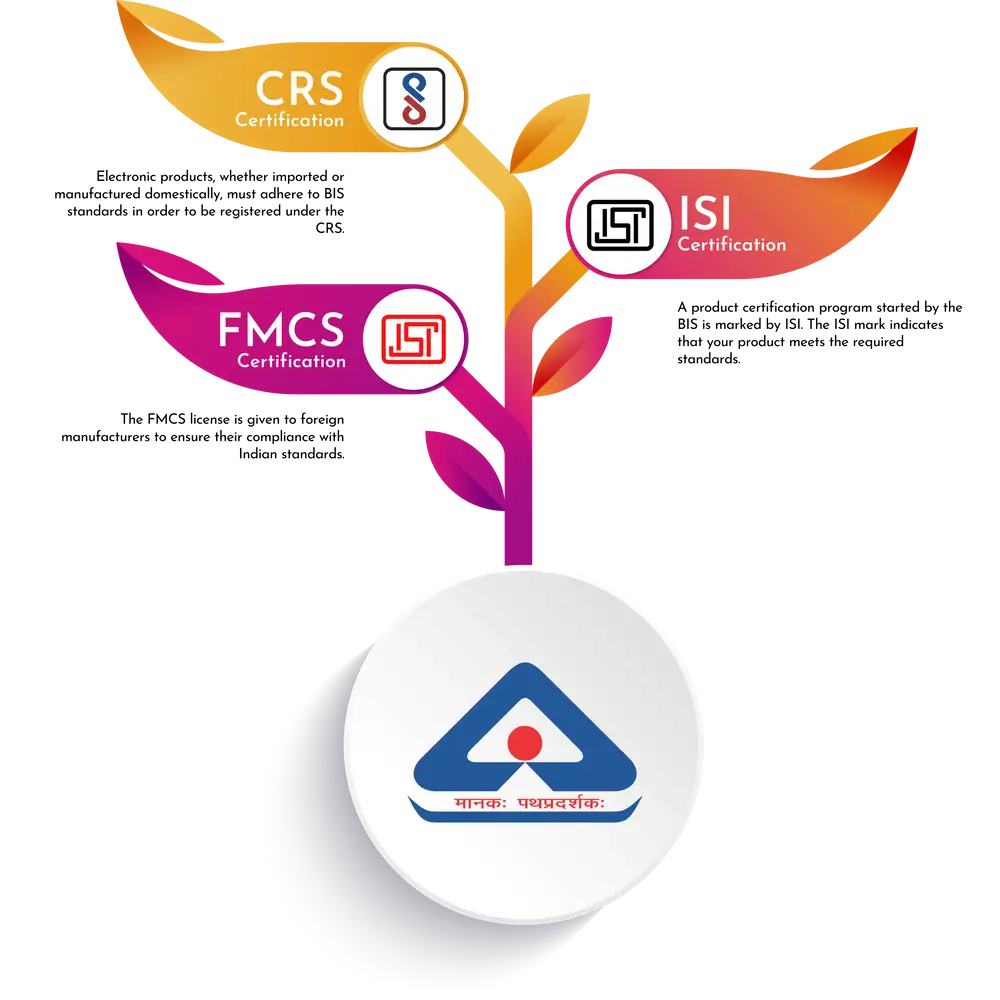
Through FMCS, BIS ensures that foreign-made products comply with mandatory Indian quality and safety requirements before they can enter the Indian market.
Get Service NowBasic Requirements
To obtain the ISI Mark Certification under the Foreign Manufacturers Certification Scheme (FMCS), overseas manufacturers must meet specific technical and regulatory conditions laid out by the Bureau of Indian Standards (BIS). These requirements ensure that imported products meet the same safety and quality standards as those manufactured in India.
Key Requirements for BIS Certification (FMCS):
- Legally Registered Manufacturing Unit
The applicant must own a registered production facility outside India.
- Compliance with Applicable Indian Standards (IS Codes)
The product must conform to the relevant BIS-specified Indian Standard.
- Authorized Indian Representative (AIR)
Foreign manufacturers must appoint an Authorized Indian Representative to act as a liaison with BIS.
- In-House Testing Facility
The factory should have essential testing equipment to perform routine quality checks as per BIS norms.
- Product Sample Testing
Samples must be submitted to BIS-recognized laboratories in India for testing and evaluation.
- Factory Audit Readiness
The manufacturing facility must be ready for inspection by BIS officials, who travel internationally to assess compliance.
.png)
Meeting these requirements is mandatory before applying for the ISI Mark under FMCS. Any gaps in documentation, testing, or compliance may result in delays or rejection of the certification application.
At SS Global Services, we specialize in guiding foreign manufacturers through each step of the BIS certification process—ensuring complete documentation, audit readiness, and smooth coordination with BIS authorities.
BIS ISI Mark Certification Process for Foreign Manufacturers
The ISI Mark Certification process for foreign manufacturers is managed by the Bureau of Indian Standards (BIS) under the Foreign Manufacturers Certification Scheme (FMCS). It involves multiple steps, including document submission, factory audit, product testing, and license issuance.
While the process is detailed and strictly monitored by BIS, it ensures that only high-quality, standard-compliant products enter the Indian market.

Step-by-Step Certification Process (FMCS):
- Step 1: Appoint an Authorized Indian Representative (AIR)
A resident Indian entity must be appointed to represent the foreign manufacturer in all dealings with BIS.
- Step 2: Submit BIS Application
The manufacturer files the application along with required documents, technical details, and product specifications.
- Step 3: Product Sample Submission
Product samples are sent to BIS-recognized laboratories in India for testing as per the applicable IS standard.
- Step 4: Factory Audit by BIS Officials
BIS officials conduct a physical inspection of the overseas manufacturing unit to verify production processes and quality controls.
- Step 5: Grant of BIS License
Upon successful test results and a satisfactory factory audit, BIS issues the ISI certification license to the foreign manufacturer.
Note: The process typically takes 6–8 weeks, depending on product category, testing timelines, and audit scheduling. Delays can occur if documentation or compliance requirements are incomplete.
At SS Global Services, we provide complete support for foreign manufacturers—including document preparation, AIR arrangement, sample testing coordination, and audit facilitation—to ensure smooth and timely certification.
Documents Required for BIS FMCS Licence
To obtain the ISI Mark Certification under the Foreign Manufacturers Certification Scheme (FMCS), foreign manufacturers must submit a complete set of documents to the Bureau of Indian Standards (BIS). These documents are essential for verifying the legal status of the manufacturing unit, product compliance, and the company’s ability to meet Indian standards.
Proper documentation ensures a smooth certification process and avoids delays during application review, sample testing, and factory audits.
Key Documents Required:
- Duly Filled BIS FMCS Application Form
- Business Registration Certificate of the Manufacturing Unit
- Factory Layout & Location Map
- List of Manufacturing & Testing Equipment
- In-House Testing Capabilities & Equipment Details
- Process Flowchart of Manufacturing Activities
- Product Technical Details & Specifications
- Test Reports (if any) from Internal or External Labs
- Quality Assurance & Control Procedures
- Nomination Letter for Authorized Indian Representative (AIR)
- Undertaking & Affidavits as Prescribed by BIS
- Packaging & Label Design with Proposed ISI Mark Placement
- Authorization Letter from Company Head (if signed by representative)
- Latest Bank Statement of the Manufacturer (as business proof)
- Proof of Trademark Registration (if applicable)

All submitted documents must be in English and verified by the appropriate authority. BIS reserves the right to request additional information or clarification during the evaluation process.
At SS Global Services, we ensure every document is correctly prepared, verified, and submitted as per BIS guidelines—helping foreign manufacturers avoid common errors and delays.
Get Service NowBIS Certification Fees
To obtain the ISI Mark, a manufacturer must comply with the essential criteria set by the Bureau of Indian Standards (BIS). These requirements ensure that the product meets the quality, safety, and performance standards defined under the relevant Indian Standard (IS code).
| Sr No. | Type of Fees/Charges | Amount |
|---|---|---|
| 1 | APPLICATION FEE | INR 1000/- (Minimum 15 USD) |
| 2 | PBG | 10,000 USD(Refundable to Manufacturer after Withdrawn of license from indian Government) |
| 3 | PER DIEM EXPENSES FOR THE BIS OFFICERS | 300 - 400 USD (Depending on the country of origin) |
| 4 | CHARGES FOR THE VISIT | INR 42000(Can vary as per FMCD) |
| 5 | CONTINGENCY FUNDS | INR 10000 |
| 6 | CHARGES TOWARDS AIRFARE AND VISA, etc | ₹ 2-4 Lakh (Depending on the country of origin) |
| 7 | Sample Testing Charges | As Applicable |
Key Fee Components:
- Application Fee:
Non-refundable fee payable at the time of application submission.
- Inspection Charges:
Travel and inspection costs for BIS officials visiting the foreign manufacturing unit.
- Sample Testing Fee:
Charges for product testing at BIS-recognized laboratories in India.
- Marking Fee:
Annual fee based on the quantity of production and use of the ISI mark.
- Renewal Fee:
Applicable during license extension or renewal (typically after 1 year).
Note: Additional costs such as courier, documentation, translation, and Indian Representative (AIR) support may also apply.
BIS fees may vary depending on the product type, number of variants, and location of the factory. At SS Global Services, we help you estimate the total cost upfront and guide you through fee payments, documentation, and compliance—ensuring a smooth certification journey without hidden charges.
Get Service NowNomination of AIR in BIS FMCS
As per the Foreign Manufacturers Certification Scheme (FMCS) under the Bureau of Indian Standards (BIS), it is mandatory for all foreign applicants to appoint an Authorized Indian Representative (AIR). The AIR acts as a legal and regulatory liaison between the foreign manufacturer and BIS for all certification-related communication and compliance matters in India.
The nomination of a reliable AIR is a crucial requirement for initiating the ISI Mark Certification process for foreign manufacturers.
Responsibilities of the Authorized Indian Representative:
- Acts as the official contact point between BIS and the foreign manufacturer.
- Assists in submitting the application, documents, and product details to BIS.
- Coordinates for sample testing, inspection visits, and factory audit support.
- Handles ongoing communications and compliance updates with BIS.
- Responds to any queries, clarifications, or notices from BIS on behalf of the manufacturer.
- Ensures post-certification responsibilities, including marking fee payments and license renewal.
Who Can Be Nominated as an AIR?
- An Indian national or a legally registered company in India.
- Must have an established office address within India.
- Should have no conflict of interest with BIS regulations.
- Must submit a formal Nomination Letter and Undertaking as per BIS guidelines.

At SS Global Services, we help foreign manufacturers by acting as their Authorized Indian Representative (AIR) or guiding them in appointing a compliant AIR. Our experienced team ensures smooth coordination with BIS, timely updates, and full regulatory compliance throughout the certification process.
Get Service NowProducts Requiring ISI Mark Certification as per BIS Norms
The ISI Mark is a certified symbol issued by the Bureau of Indian Standards (BIS) that confirms a product's compliance with the Indian Standards (IS codes) for safety, performance, and quality. It stands for Indian Standards Institute, and is a mandatory certification mark for several products sold in India, especially in sectors like electronics, construction materials, kitchen appliances, and industrial goods.
| Sr No. | Product | IS Standard | Certification Type |
|---|
Benefits of BIS ISI Certification (FMCS – For Foreign Manufacturers)
For foreign manufacturers exporting to India, obtaining the ISI Mark under the Foreign Manufacturers Certification Scheme (FMCS) is not just a regulatory requirement but also a gateway to one of the world’s largest consumer markets. At SS Global Services, we make the entire FMCS certification process smooth, ensuring that your products comply with Indian Standards (IS) while building global credibility and trust.




Key Benefits of BIS FMCS Certification for Foreign Manufacturers:
- Market Entry into India
FMCS certification is mandatory for foreign manufacturers dealing in over 150 product categories. It ensures seamless access to the Indian market by meeting regulatory compliance and avoiding customs clearance issues.
- Global Quality Recognition
The ISI Mark is a symbol of quality and safety recognized across India. When your product carries the ISI logo, it demonstrates adherence to stringent BIS standards, giving your brand international credibility.
- Legal Compliance & Risk Mitigation
Non-certified products face strict import restrictions, penalties, or rejection at ports. With FMCS, you ensure full compliance with the BIS Act, 2016, and safeguard your business from legal and financial risks.
- Stronger Business Opportunities
Many government tenders, institutional purchases, and large retail chains in India mandate ISI certification. FMCS opens doors to these business opportunities, helping foreign brands establish themselves as trusted suppliers.
- Enhanced Consumer Trust
Indian buyers, both B2B and B2C, prefer ISI-marked products for reliability and safety. Certification improves consumer confidence, which directly supports higher sales and long-term market sustainability.
- Faster Customs Clearance
ISI-certified products under FMCS face fewer import delays. Certification helps in smoother customs clearance and faster entry into the Indian supply chain.
- Brand Reputation & Long-Term Growth
Being BIS-certified positions your company as a quality-driven and consumer-focused brand. This reputation not only strengthens your market presence in India but also boosts trust with global clients.
- Competitive Edge in Indian Market
With certified quality, your products gain a distinct advantage over non-certified imports. ISI certification improves acceptance in retail, industrial, and government channels, giving you an edge in India’s competitive market.
At SS Global Services, we specialize in guiding foreign manufacturers through the FMCS process—from documentation and factory inspection to liaison with BIS authorities. Our goal is to ensure faster approvals, minimal delays, and hassle-free certification so your brand can focus on expanding in India with confidence.
Get Service NowFrequently Asked Questions (FAQs)
Foreign Manufacturers Certification Scheme (FMCS) under BIS ISI Mark often raises many questions for companies looking to export products to India. Since the process involves product testing in BIS-recognized labs, factory audits, documentation, and compliance with Indian Standards, having the right guidance is crucial. Below, we have compiled the most frequently asked questions to help foreign manufacturers understand the complete certification process clearly.

Our Top Services
At SS Global Services, we offer a complete range of certification and compliance services tailored to meet the needs of manufacturers, importers, and brand owners. From BIS and BEE certifications to EPR, WPC, TEC, and LMPC registrations, our expert-led process ensures fast approvals, minimal delays, and full legal compliance. Our top services are trusted by startups and global enterprises alike for their accuracy, reliability, and support at every step.

BEE registration for electrical appliances ensures energy efficiency compliance in Indian markets.

Mandatory CRS registration for electronics under BIS ensures product safety and performance compliance.
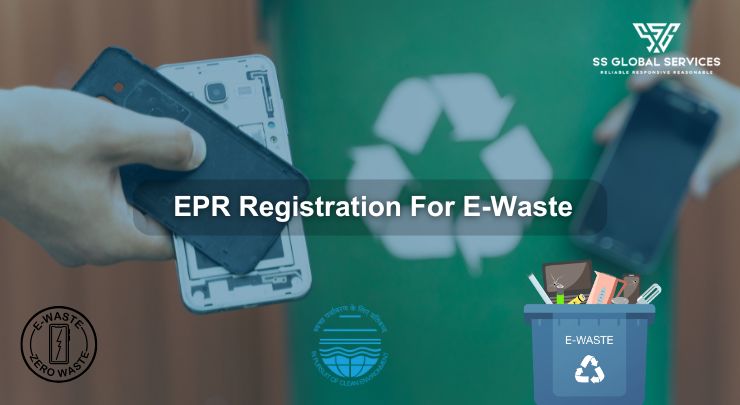
Register under CPCB's EPR policy to manage and dispose of e-waste responsibly and lawfully in India.
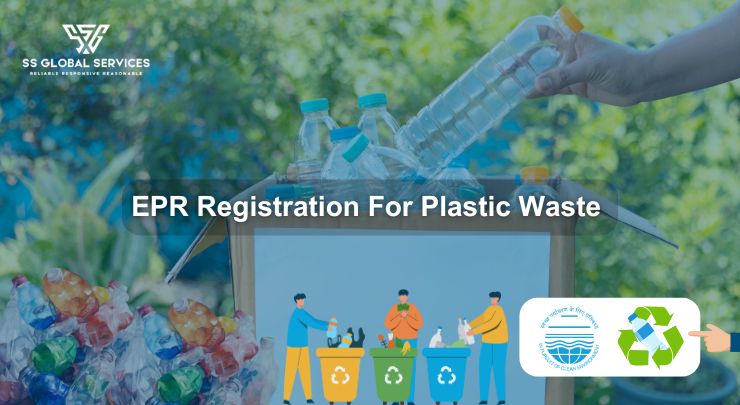
Plastic waste certification under EPR ensures legal compliance for producers and brand owners in India.
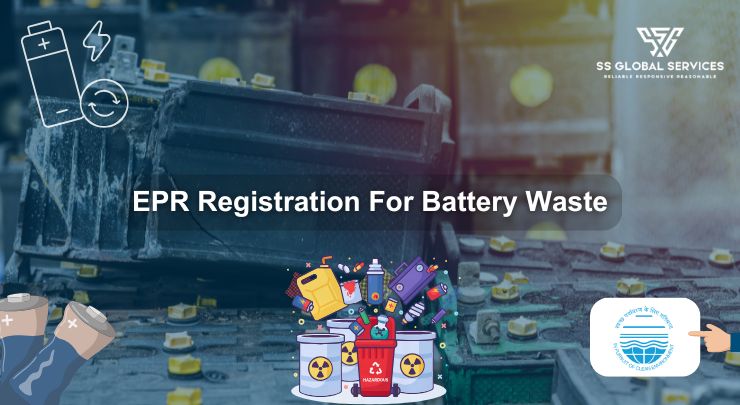
Battery waste registration ensures safe handling, recycling, and regulatory compliance for all producers.
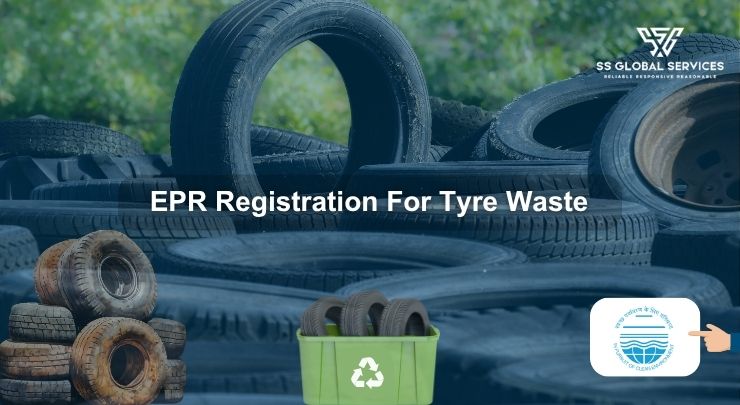
Tyre producer registration to comply with EPR norms and sustainable waste disposal systems.
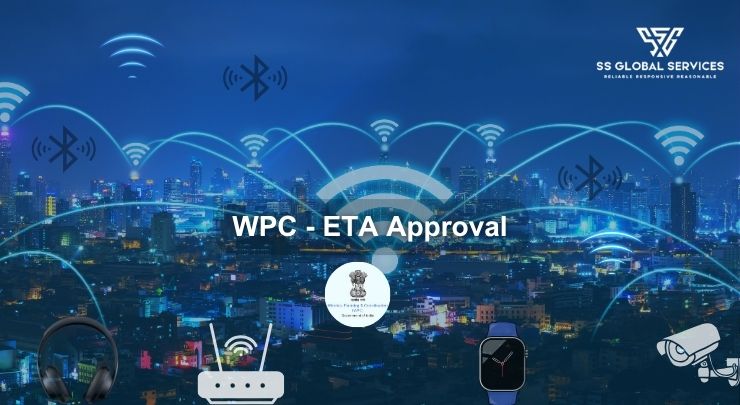
Mandatory ETA approval from WPC for importing RF-enabled wireless, Wi-Fi, and IoT devices in India.
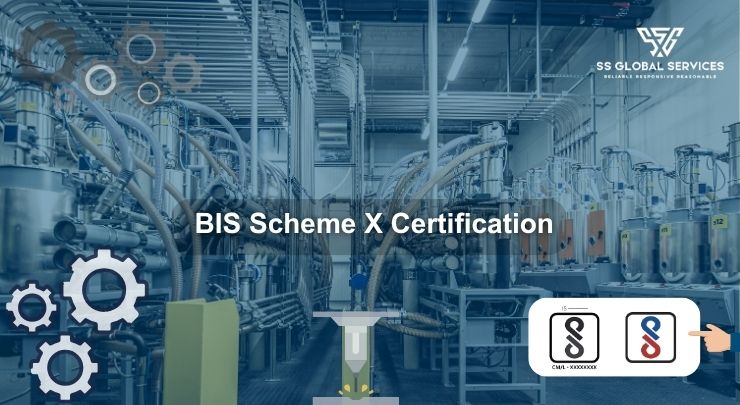
Certification under BIS Scheme-X is mandatory for specific products as per Indian regulatory standards.

Telecom and networking devices must be certified under TEC/MTCTE to be legally sold or used in India.
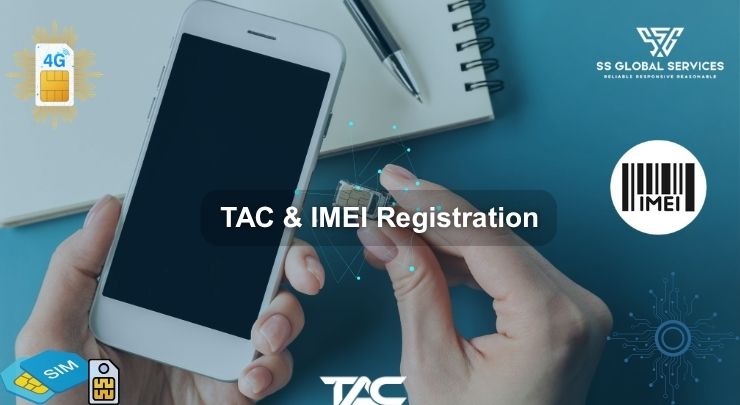
TAC and IMEI registration is required to legally import and sell mobile devices in the Indian market.
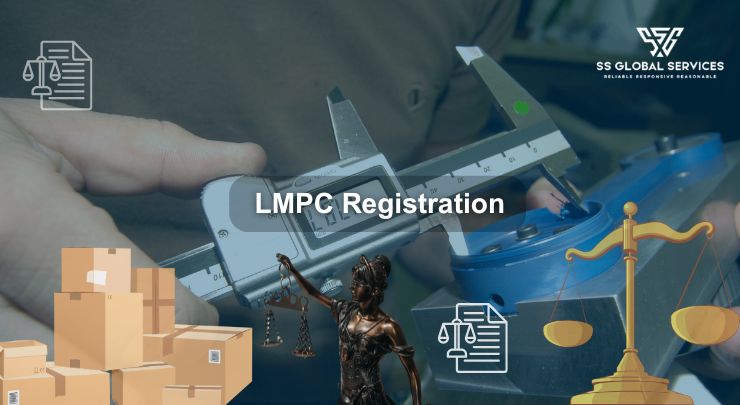
Legal Metrology registration for importers ensures proper labelling and packaging of goods in India.
Request Service Today!
Ready to get certified or need expert compliance support? Fill out the form below and our team at SS Global Services will connect with you shortly.
We offer fast, reliable, and hassle-free assistance for all BIS and regulatory certification needs.